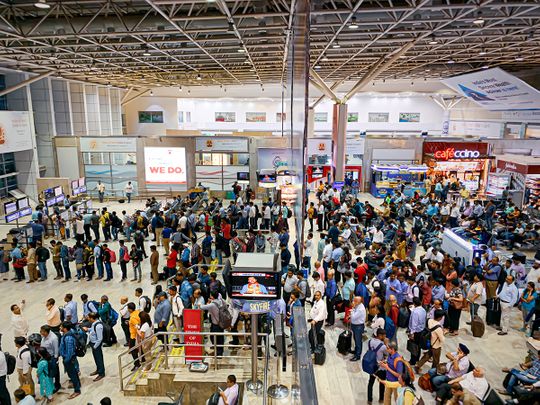Dubai: Passengers from UAE to India who had been deferring their travel plans because of high airfares can now breathe easy.
After three months of high fares, booking aggregators and travel agents have confirmed that return ticket prices from UAE to India are set to decrease by 15-30 per cent from summertime highs of Dh1,800 to Dh2,600.
Rates are expected to soften after September 14 and remain in the Dh794 to Dh952 range until November 1. These fares will remain consistent on flights to major cities in India. Following this, fares are expected to stay elevated until the second week of January 2024, coinciding with the festival season as well as the New Year rush, say travel agents. Moreover, Dubai’s flagship carrier Emirates will introduce Premium Economy services to Mumbai and Bengaluru from October 29, coinciding with the beginning of the winter peak season.
Basheer Mohammed, General Manager of Europe Travel and Tours, said, “After an expensive summer, especially for average middle-class families, fares are finally stabilising in the India-UAE sector.” He added, “Currently, fares to the Mumbai and Delhi sectors are from Dh900 to Dh1,200. Fares to South Indian destinations are also in the same price range.”
Sweet respite in airfares
Many Indian expatriates returning to the UAE after the summer holidays had to delay their travel plans due to a more than 200 per cent increase in fares compared to off-season dates.
ALSO READ
- Tourists are packing European hotspots undaunted by higher airfares and hotel costs
- Here’s why UAE residents will spend more on travel
- UAE-India travel: Fares rise as high as 200%, forcing many expats to postpone returns until September
However, fares for round-trip travel have now significantly dropped. For instance, an Economy class ticket from Dubai to Mumbai was initially priced at Dh890-Dh1,200 for travel from September 4 to 9 but has now been reduced to Dh845-Dh928 for travel from September 14 to 21. Similarly, Delhi-Dubai flights were priced at Dh1,073 for late August to early September travel, but they now average Dh908 for later this month.
On the hyper-busy South India sector, especially Kerala, fares had surged to Dh1,288-Dh2,277 in late August. However, off-peak fares for September and October now average Dh600-Dh1,000 per traveller. Dubai to Kochi fares stand at Dh922 (compared to return fares of Dh1,427), and Dubai to Chennai is Dh914 (compared to peak-summer highs of Dh1,718).”
Uptick in inbound travel
The inbound UAE share has seen a marked increase from 28 per cent to 39 per cent, indicating strong interest from international travellers to explore UAE’s offerings, said Atish Thapa, Head of Business and Marketing Middle East, Cleartrip.com.
Stay trends, according to Thapa, indicate that Indian travellers stay longer in the country. “About 24 per cent of the visitors are staying for four weeks, compared to the 23 per cent choosing to stay for one week,” he explained. About 15 per cent stay for five weeks. “This reflects a healthy blend of short-term tourists seeking a brief getaway and longer-term visitors, including those visiting friends and relatives,” Thapa added.
Busy season ahead
According to Sachin Gadoya, CEO and Co-Founder of musafir.com and Musafir Business, as Q4 draws near, the UAE’s travel landscape is set for a massive change. “A convergence of many factors, including pleasant weather and a busy event calendar, is expected to cause a surge in inbound travel” especially from India, which remains UAE’s leading source market for inbound travellers, said Gadoya.
According to the Dubai Department of Economy and Tourism, Dubai welcomed 1,223,000 travellers from January to June this year, a 43 per cent hike compared to the same period last year. With mega events like the Formula 1 Etihad Airways Abu Dhabi Grand Prix to COP28, this sector will see a substantial rise in inbound travel, said Gadoya. “We also predict several travellers to blend business with leisure activities,” he added.
Source: Read Full Article
